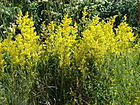Note: This is a project under development. The articles on this wiki are just being initiated and broadly incomplete. You can Help creating new pages.
Difference between revisions of "Galium verum"
| (One intermediate revision by the same user not shown) | |||
| Line 1: | Line 1: | ||
[[File:Bumblebee&flowers.jpeg|thumb|right]] | [[File:Bumblebee&flowers.jpeg|thumb|right]] | ||
| − | '''Galium verum''' is a perennial plant that can grow up to 0.60 metres tall. | + | '''Galium verum''' is a perennial plant that can grow up to 0.60 metres tall. It is harvested from the wild for local use as a food, medicine and source of materials. |
| − | It is harvested from the wild for local use as a food, medicine and source of materials. | ||
==Uses== | ==Uses== | ||
| − | {{Uses| | + | {{Uses|Skin complaints}}, {{Uses|Urinary disorders}}, {{Uses|Epilepsy}}, {{Uses|Inflammation}}, {{Uses|Cuts}}, {{Uses|Skin infections}}, {{Uses|Slow-healing wounds}}.<ref name="Uses"/> |
==Parts Used== | ==Parts Used== | ||
Latest revision as of 15:16, 22 May 2020
Galium verum is a perennial plant that can grow up to 0.60 metres tall. It is harvested from the wild for local use as a food, medicine and source of materials.
Contents
- 1 Uses
- 2 Parts Used
- 3 Chemical Composition
- 4 Common names
- 5 Properties
- 6 Habit
- 7 Identification
- 8 List of Ayurvedic medicine in which the herb is used
- 9 Where to get the saplings
- 10 Mode of Propagation
- 11 How to plant/cultivate
- 12 Commonly seen growing in areas
- 13 Photo Gallery
- 14 References
- 15 External Links
Uses
Skin complaints, Urinary disorders, Epilepsy, Inflammation, Cuts, Skin infections, Slow-healing wounds.[1]
Parts Used
Chemical Composition
Common names
| Language | Common name |
|---|---|
| Kannada | |
| Hindi | |
| Malayalam | |
| Tamil | |
| Telugu | |
| Marathi | |
| Gujarathi | |
| Punjabi | |
| Kashmiri | |
| Sanskrit | |
| English |
Properties
Reference: Dravya - Substance, Rasa - Taste, Guna - Qualities, Veerya - Potency, Vipaka - Post-digesion effect, Karma - Pharmacological activity, Prabhava - Therepeutics.
Dravya
Rasa
Guna
Veerya
Vipaka
Karma
Prabhava
Habit
Identification
Leaf
| Kind | Shape | Feature |
|---|---|---|
Flower
| Type | Size | Color and composition | Stamen | More information |
|---|---|---|---|---|
| {{{5}}} |
Fruit
| Type | Size | Mass | Appearance | Seeds | More information |
|---|---|---|---|---|---|
Other features
List of Ayurvedic medicine in which the herb is used
Where to get the saplings
Mode of Propagation
How to plant/cultivate
Prefers a loose moist leafy soil in some shade, but it tolerates a position in full sun. Plants are tolerant of dry soils. but do not thrive in a hot climate. They dislike very acid soils.[4]
Commonly seen growing in areas
Photo Gallery
References
- ↑ Indian Medicinal Plants by C.P.Khare
- ↑ [Chemistry]
- ↑ [Morphology]
- ↑ Cultivation
External Links
- Ayurvedic Herbs known to be helpful to treat Skin complaints
- Ayurvedic Herbs known to be helpful to treat Urinary disorders
- Ayurvedic Herbs known to be helpful to treat Epilepsy
- Ayurvedic Herbs known to be helpful to treat Inflammation
- Ayurvedic Herbs known to be helpful to treat Cuts
- Ayurvedic Herbs known to be helpful to treat Skin infections
- Ayurvedic Herbs known to be helpful to treat Slow-healing wounds
- Herbs with Leaves used in medicine
- Habit - Perennial
- Index of Plants which can be propagated by Seeds
- Index of Plants which can be propagated by Division in spring
- Herbs that are commonly seen in the region of Waste ground
- Herbs that are commonly seen in the region of Roadsides
- Herbs
- Pages without herbs images





